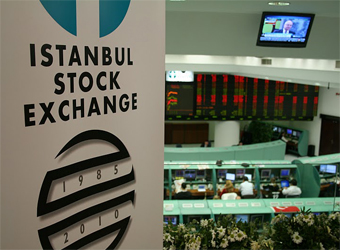Turkey’s markets recovered on Monday from a slide that took the country’s currency to new lows as the government fights allegations of corruption that have heightened perceptions of political risk.
After hitting an all-time low of TL2.17 to the dollar on Friday, the Turkish lira recovered to TL2.12 by Monday evening, while the main stock market index rose 6.5 per cent on the day, making up most of last week’s losses.
“It is a bad day for people predicting doomsday,” tweeted Mehmet Simsek, the country’s finance minister, pointing to the rise in the Borsa Istanbul index and the strengthened lira.
Mr Simsek has argued that the lira’s slide to date could help Turkey reduce its large current account deficit and that any economic slowdown was likely to be temporary.
But financial analysts warned that perceptions of Turkey’s political risks remained despite the rebound, and emphasised that the central bank had sold large amounts of foreign exchange in its bid to bolster the currency.
Ozgur Altug, an economist at BGC Partners in Istanbul, noted that the central bank had sold $2.4bn since December 24, including $600m on Monday, with another $600m due to be sold on Tuesday. He estimated the bank’s net reserves at $38.5bn – significantly lower than other emerging markets.
“The political risk premium in the new year, and foreigners’ approach to Turkey, will determine everything in 2014,” Mr Altug said.
Nilufer Sezgin, an economist at Erste Securities, added that selling of the currency, largely by locals, had reached panic levels last week and that it was natural to see a rebound. But she cautioned: “There is no change in outlook – people are concerned about recent developments.”
Still unclear is how Turkey’s biggest corruption scandal for years will affect an economy largely based on domestic demand and how the lira’s slide will effect the country’s $164bn of short term foreign exchange debt, largely held by the private sector.
The government reacted to the crisis, which began with the arrest of the sons of cabinet ministers and the head of a state bank, by moving hundreds of police officers and endeavouring to increase its control over prosecutors.
By so doing, Recep Tayyip Erdogan, prime minister, has effectively stalled a second wave of arrests that prosecutors had sought to carry out last week.
Government officials depict the corruption probe as a virtual coup attempt, spearheaded by followers of Fethullah Gulen, an Islamist preacher who has many supporters in the police and prosecution service and who has split with the ruling AK party.
“It seems we are now at a deadlock between the judiciary and the police,” said Sinan Ulgen of the Carnegie Europe think tank, adding that prosecutorial warrants signed by judges remained in force even if the police were not implementing them.
Turkey’s image had already been badly tarnished, he said: “You either have a corrupt government or a corrupt, captive or infiltrated judiciary.”
In an indication of the broader impact of the crisis, Guler Sabanci, chairwoman of Sabanci Holding, one of Turkey’s largest conglomerates, said on Monday she was following the corruption allegations with concern. She emphasised the importance of the independence of the judiciary and the rule of law.
Officials have derided the prosecutors’ allegations, which have appeared in leaks in the press, as fabrications, ridiculing claims of $100bn in corruption and brandishing title deeds to show that land was not transferred below value.
Bulent Arinc, deputy prime minister, on Monday warned the country’s top body of judges and prosecutors that it would face “consequences” for having said last week that new government controls on investigators were unconstitutional.
Source: The Financial Times


